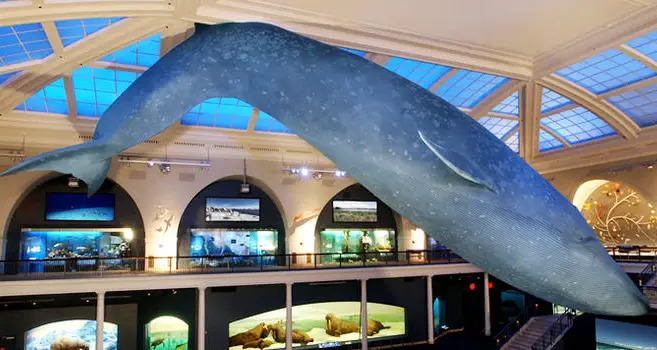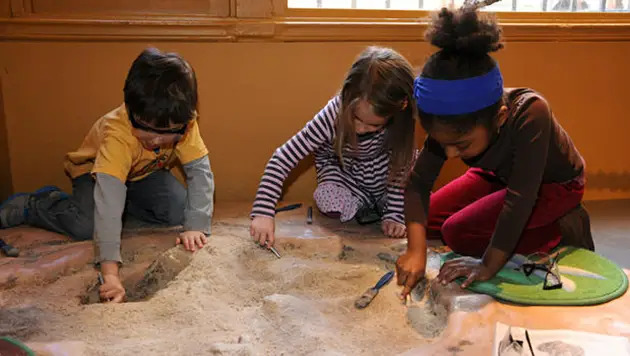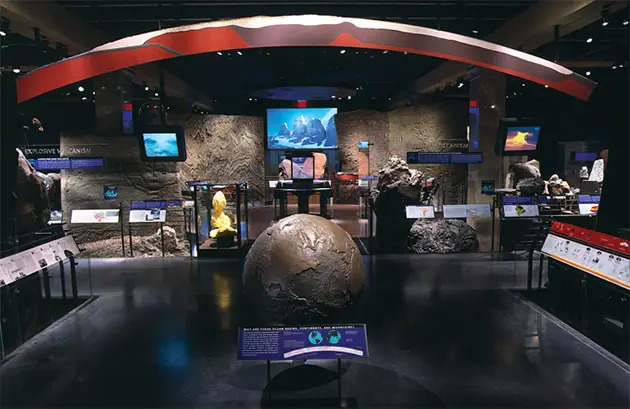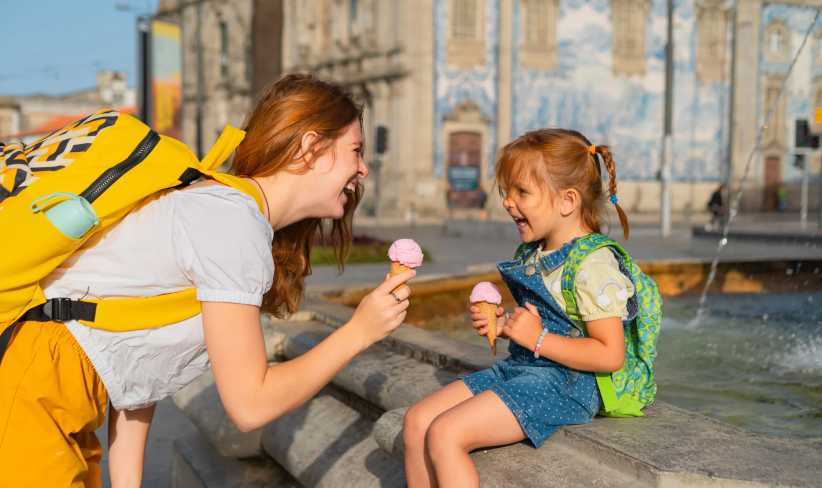Discover the best things to do and see at the American Museum of Natural History with your kids. Plus, get tips for making the day easy and relaxing for the whole family.
If you grew up in this area, odds are good your first memory of this landmark was from a school field trip. Now, it’s time to bring your own kids. The best part will be seeing them get the same thrills you did. This museum has never been more popular with residents and tourists, thanks at least in part to the popular “Night at the Museum” movie series. But it can be daunting without a plan. Read on for the strategies that will make your trip extra special.
Museum Overview
The American Museum of Natural History is one of the most well-known and beloved museums in all of New York City, if not the United States. Containing dozens of exhibits and theater shows, it is one of the few museums that both kids and parents can (really) equally enjoy. The experiences you can choose from feel like a microcosm of the life itself: from space to dinosaurs to Lucy, the most complete early hominid skeleton, to the artifacts of Asian and European civilizations.
Standby Kid Faves

| Take a moment to feel small as you stand under the blue whale in the museum's Hall of Ocean Life, which stretches 94 feet long. |
Decide which exhibits you want to see before you leave home so you and your kids can have the best experience possible. Luckily, that’s not so hard: The museum is home to stellar must-sees for kids. The dinosaurs are the runaway fan favorites, with children staring wide-eyed at the life-sized reassembled skeletons of prehistoric animals such as the stegosaurus, palaeosaurus, and “bad guy” tyrannosaurus-rex. The dino floor also houses extinct denizens of a later era, such as the wooly mammoth and saber tooth tiger. Every display tells about each creature: how they lived, their best weapons for attacking and defending, what they ate, how they bred. Even grander in scale is the famous blue whale that is suspended on the ceiling in the Hall of Aquatic Life on the first floor. Not only is this a fascinating area to learn about the wonders of our ocean, but it is also a great place to stop and rest. You’ll find a big, open area under the whale to sit. Sarah, an obviously-impressed 9-year old, said that her favorite part of the whole museum is the whale because “it’s so big! I have never seen anything so big. It is really cool to see a whale in real life and not just talk about it in school.”
Secrets to Discover with Your Kids
Besides those universal favorites, there are plenty of little-known gems that even repeat visitors may inadvertently pass by.

The Discovery Room on the first floor is one of those special exhibits. Inside, all of the draws the museum is best known for are presented in a way that even the youngest children can understand. In this hands-on mini museum, kids dig for dinosaur bones, search for exotic animals in the big baobab tree, or simply sit down and read a children’s book that delves into the subject of an exhibit. There are also live animals and a large cabinet stuffed with items that kids tend to love, such as shells, feathers, bones, and unique rocks worthy of inspection.
While not as hands-on as The Discovery Room, the Warburg Hall of NY State Environment on the first floor is still a fascinating, engaging (and oft-overlooked) section. Practically empty on both days I visited, the hall shows cool dioramas of New York farms and orchards complete with tractors, trees, people, and animals. It even showcases a cross-section view for an inside look at the maze-like tunnels of moles and other local below-ground dwellers. One section has a blown-up simulation of insects, showing a dog-sized millipede, spider, and other buggers. While not for arachnophobes, it’s a pretty safe bet the kids will go crazy (in a good way).

Traveling (way) up in scale from ants, a monumental bronze globe greets you as you enter the Gottesman Hall of Planet Earth on the first floor adjacent to the Rose Center for Earth and Space. Tucked away in a dark hall hidden in the corner of the center, kids can have fun turning the metal earth, exploring the high mountain ranges, vast oceans, or any other feature your child may be curious about. Then look up! Right above you is an 8-foot wide “Dynamic Earth” that projects a perspective of earth from space; watch it make a full rotation in 12 minutes.
Know Before You Go
Before your kid can be amazed, you need to be in the know. First, download the AMNH Explorer app from the Apple App Store. This app is a life-saver, especially if you’re the type who is easily disoriented. It allows you to see where you are in respect to other exhibits. The 3D map shows where everything is, down to each bathroom with changing tables and the souvenir shops. If you don’t have an iPhone, you can use Google Maps on your Android device, which has its own map of the museum. A blue dot accurately tracks your movements, guiding you through exhibitions (and to the restrooms as well).
The $2 fee for the coat check is worth it if you’re traveling with heavier jackets, strollers, or shopping bags from your previous stop. You can bring your stroller throughout the museum, but be aware you’ll encounter many staircases (as well as painfully slow, sometimes crowded, elevators). If your child is able to walk, you may want to consider letting him.
Except where signs say otherwise, photography is also allowed, flash included, but tripods and lights are not.
The museum doesn’t allow outside food to be brought in, so you’ll need to plan. Hyper is one thing; hyper and hungry is a completely different beast! A large food court is on the lower level; several cafes are found on different floors of the museum. While the eats are tasty, they’re also predictable and expensive. A family-sized table at any of the eateries may be tough to snag during peak hours, so plan to nosh around 11 or after 2. And don’t even think about skipping breakfast, since you and your child will be doing a lot of walking.
DETAILS
Location: Central Park West and 79th Street, right across the street from Central Park, a handy pre or post-museum diversion. The C train stops right underneath the museum. Or take the M79 bus to 81st Street.
Prices: The suggested prices for General Admission tickets, which supports the Museum’s scientific and educational endeavors, are $22 for adults, $12.50 for children 2-12, and $17 for seniors and students. Some special, temporary exhibits have separate admission fees. Find the current line-up of exhibitions.
• Get details on current exhibits at AMNH and other NY metro area museums.
• Consider yourself a tourist! Find deals, tour recommendations and more for AMNH and the surrounding area.
Main photo: C. Chesek/AMNH
All other photos: Courtesy AMNH.org















